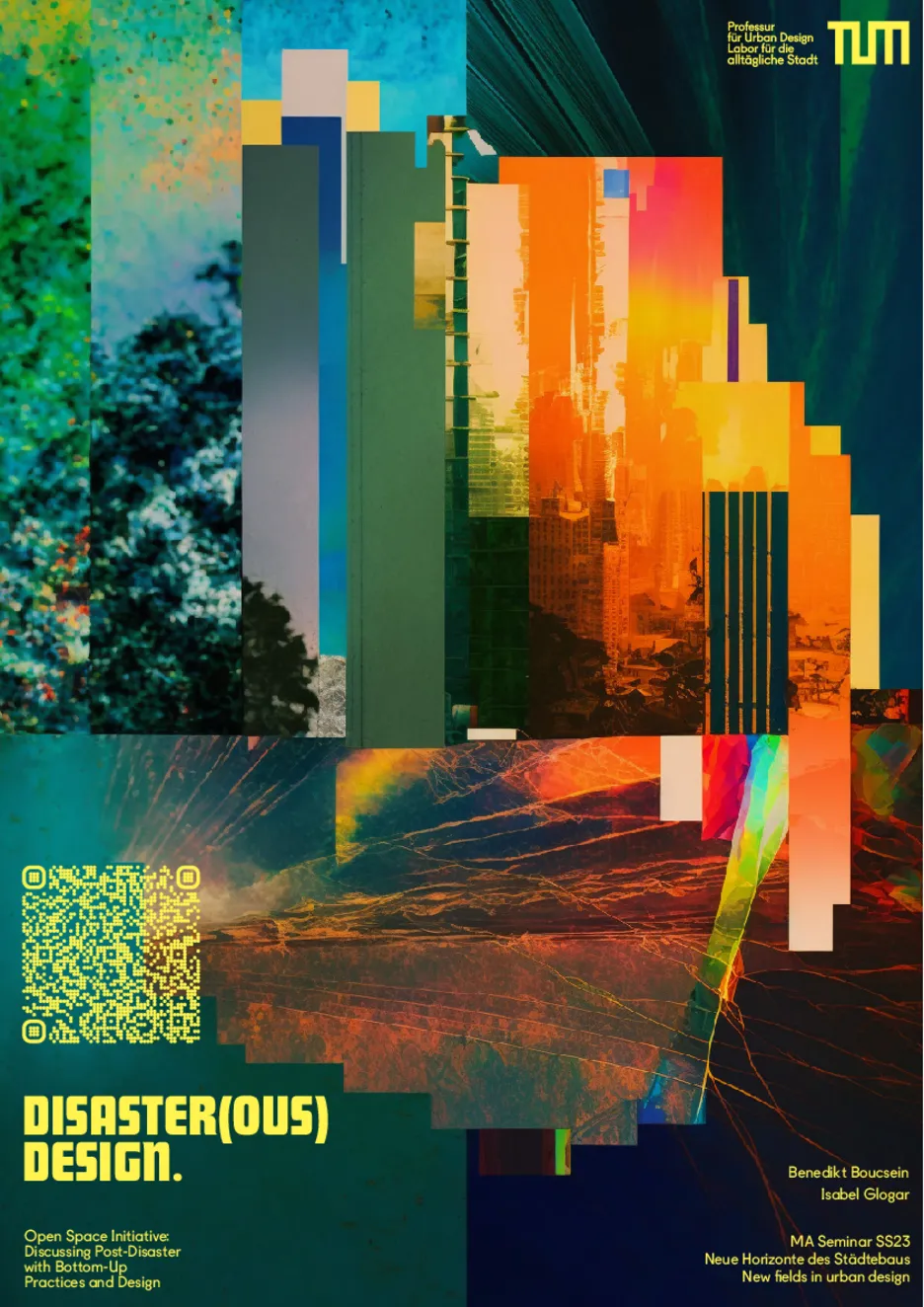disaster(ous) design.
Open Space Initiative: Discussing Post-Disaster with Bottom-Up Practices

MA Seminar SS23
Neue Horizonte des Städtebaus / New fields in urban design
disaster(ous) design.
Open Space Initiative: Discussing Post-Disaster with Bottom-Up Practices and Design
Team: Benedikt Boucsein, Isabel Glogar
Introduction: Monday 24th of April 2023, 13.15h, Alte Bibliohtek (2350)
The earthquake in Turkey and Syria in February 2023 is the latest in a series of disasters that strongly demonstrates the close link between planning and so-called natural disasters. In the interdisciplinary seminar "New Fields in Urban Design: Disaster(ous) Design" we will explore and center on questions that question the self-understanding of planning. To this end, we deliberately broaden the horizon beyond the classical understanding of architecture and urban design and engage in dialogue with other disciplines and perspectives. The question "what can we do?" will occupy us in a narrower and broader sense, even though we know that it is very difficult to answer.
We want to use the space to discuss individual ideas and develop initiatives on how we as planners can deal with the climate emergency and disasters, such as the recent earthquake in Turkey and Syria, also in the context of impacts of our planning and building of the last decades as "disaster(ous) design" in the future. We want to give space to discuss as group and in cooperation with local initiatives like the "recovery Design Initiative" of TUM, "Architecture for All Turkey" (Herkes için Mimarlık) and "Disaster Map" (Afet Haritası) as well as international guests. The aim is also to provide space for bottom-up ideas, and cooperation and discussion with guests as Prof. Tatjana Schneider and initiatives invited by the seminar participants to discuss possible changes in conditions and contributions embedded in the respective contexts.
In the background is the realization that the "modern project" has fundamentally failed, as its norms, goals and approaches are causal for climate change. This fundamentally questions our self-image as planners, but at the same time opens up the possibility of rethinking almost everything. We would therefore like to use the seminar to rethink the idea of planning practice in the face of entanglements in catastrophic events of various natures. What kind of activity will be needed in the future to be better prepared for disasters? Which ones to prevent them? Which ones to respond to them? How do we fund these activities, and what is specific to the European context?
Participants will work on a topic in this context based on an individually chosen case, analyze existing organizations, projects and examples, and work on and organize ideas and initiatives.
In the seminar we want to give space for students to discuss initiatives, ideas and questions on how to support affected people in this irreversible catastrophe cases with bottom-up contributions in cooperation with local stakeholders and taking into account local conditions. We want to give space and time to openly formulate questions.
What possibilities do we have to contribute with our means as planners as support? In addition to architectural and urban planning interventions, we want to open up spaces beyond planning and design. Which initiatives can we encourage? The starting point will be a joint discussion of individual starting points and questions. We want to develop a common group structure and initiate your ideas.
Our planning culture, which still defines itself as a primarily building practice and is oriented towards the ideas of modernity and growth, can also be seen as largely failed with regard to the reconstruction of disaster areas: It is directly partly responsible for the climate catastrophe. The post-war reconstruction and urbanist ideas of modernism showed how new ideas of modernism wanted to rebuild cities often with tabula rasa and little reference to local conditions according to the ideas of the time, new models and building typologies of standardized housing emerged. However, we want to deal with a more open kind of post-disaster, away from new urban planning and our western ideas. We want to work in interdisciplinary and transdisciplinary teams and groups to discuss expanded architectural practices.
We will take on roles of activists, consultants, researchers, artists, or project developers and seek cooperation with local initiatives to address self-defined questions and ideas in the context of post-disaster.
The seminar thus functions as a collective think tank - preferably of a highly speculative, but also of a very concrete nature, leading to cooperation and various forms of work.
The goal is to develop individual questions on the basis of an idea or initiative or a concrete project or design. At the end of the semester, the results will be presented in a public event and exhibition at the UD Fest.